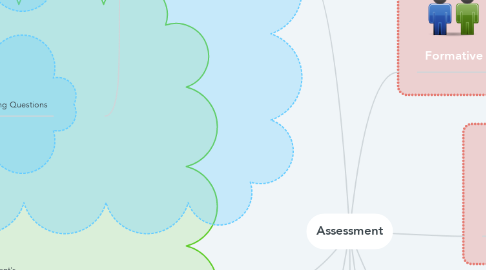
1. Assessment Data
1.1. Definition: Teacher can obtain the student's assessment data to find and implement teaching strategies to meet those student's needs in order to help them grow.
1.1.1. Student 1: EDL - A
1.1.1.1. Strategies for Phonological awareness 1. Syllable Games 2. Rhyming Games 3. Blending Games 4. Concept of word Games
1.1.2. Student 2: EDL- 2
1.1.2.1. Strategies for Comprehension 1. Story sequence 2. Think-alouds 3. Summarizing 4. Think-Pair-Share
1.1.3. Student 3: EDL- 5
1.1.3.1. Strategies for Fluency 1. Timed repeated readings 2. Audio-Assisted reading. 3. Shared reading 4. Partner reading 5. Choral reading
2. H.O.T. Questions
2.1. Opening Questions:
2.1.1. 1. What predictions can we make by reading the tittle? 2. What do you know about _____?
2.2. Guiding Questions:
2.2.1. 1. What do you suppose the character was thinking when_____? 2. Why did the character feel____? 3. Can you predict the outcome?
2.3. Closing Questions
2.3.1. 1. What would be another good tittle for this book? 2. How would you have solved the problem?
3. Cited Sources
3.1. 1. http://aub.edu.lb/ctl/Documents/CLO%20summer%202012/Diagnostic%20formative%20summative%20asst.pdf 2. http://www.specialeducationguide.com/pre-k-12/response-to-intervention/effective-rti-strategies-for-teachers/ 3. https://www.slideshare.net/CielEducttu/m9-presentation-61929780 4.http://www.readingrockets.org/teaching/reading-basics/phonemic 5. Mindmeister.com image library
4. Formative
4.1. Definition: Process of gathering evidence of student learning. Providing feedback and adjusting instruction strategies to enhance achievement.
4.1.1. Examples: 1.Quiz 2. Discussion 3. Pre-Test
5. Interim/Benchmark
5.1. Definition: A form of assessments that evaluate where students are in their learning progress and determine whether they are on track to performing well on future assessment.
5.1.1. Examples 1. Projects 2. Test
6. Summative
6.1. Definition: Student learning evaluation at the end of an instructional unit by comparing it against some stands or benchmark.
6.1.1. Examples: 1.STAR test 2. Semester exams
7. Performance
7.1. Definition: Known as alternative or authentic assessment. Its a form of testing that requires students to perform a task rather than select an answer from a ready-made list.
7.1.1. Examples: 1. Projects 2. Written Assessments
8. Diagnostic
8.1. Definition: A form of pre-assessment that allows a teacher to determine students' individual strengths, weaknesses, knowledge, and skills prior to instruction.
8.1.1. Examples: 1. Journals 2. Mind map
